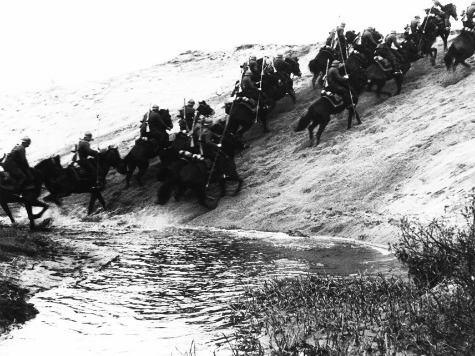
On this day, 75 years ago, the bloodiest war in human history broke out when Nazi Germany, fresh off of signing a nonaggression pact with the Soviet Union, invaded Poland. Though two years would pass before the United States entered the war, the conflict would profoundly change the American role in the world.
Adolph Hitler had duped many world leaders into believing that Germany really wanted peace and perhaps just a little “lebensraum,” or “living space.” But events would prove that they were bent on the conquest of a continent, and that the only thing that could stop this menace was military might.
German SS troops, the military arm of the Nazi Party, put on Polish army uniforms and raided several German outposts along the German-Polish border, giving the regime a false pretense for their war of conquest. At 4:45 am, on September 1, 1939, over a million Germans poured over the Polish border en route to the takeover of a country that had enjoyed less than a quarter century of independence since the end of the Great War, the so-called War to End All Wars. Poland was defeated in less than a month and the world was plunged into an even more devastaing conflict.
The image of the Polish war effort in the popular mind is of antiquated Polish cavalry making chivalric, yet doomed charges against modern, sophisticated German tanks. Yet, this narrative is more the result of Nazi propaganda; the truth was much different. The Polish army fought well against their German foes, and was not too far behind technologically. Horses were still a major part of most armies on the eve of WWII because they were logistically important for troop and supply movement. Nevertheless, the German Army, drawing from their experience in the Spanish Civil War that they treated as a training ground just a few years earlier, used a sophisticated combined arms strategy of tanks, troops, and planes to quickly cut through their valiant, but outmatched Polish foe. The use of “blitzkrieg” or “lightning war” to rapidly advance and prevent the slog of trench warfare that became the norm in WWI, had become possible because of advances in communication and transportation technology. The German military would master this technique.
Poland was beaten so quickly because, on top of fighting the advanced German war machine in the West, the Polish army had to cope with the Soviet Union’s invasion from the East. Often lost in the modern historical revisionism which claims that it was really the Soviet Union that won the war and defeated Nazism, is the fact that the Communist empire helped launch World War II, and was fully complicit in the premeditated carving up of free countries.
Germany would go on to consume all of Europe, plunging the entire continent into the darkness of the Holocaust, a genocide of Jews that many at the time believed a modern, civilized country was simply incapable of. Nazi Germany had launched a new “dark age,” as British Prime Minister Winston Churchill said in his famous “Finest Hour” speech, that would be “made more sinister…by the lights of perverted science.”
Adolph Hitler, high off of the conquest of Europe, would turn his country against its powerful partner-in-crime, the Soviet Union, thus sowing the seeds of ultimate German defeat. Yet, the more important change in the war, at least for the free world, was the entrance of the United States after the Japanese attack on Pearl Harbor on December 7, 1941. This lead to a two front war for the American people and one of the most astounding war efforts in military history. The United States, coming off of a crippling depression and years of failed economic plans, sprang into action with the most profound use of economic might that the world has ever seen, and may never see again. Not only did the United States fight in multiple, and profoundly different theaters of war, crossing vast oceans to do so, but it was also charged with supplying allied nations across the globe. The arsenal of democracy had been unleashed and carried the free world to victory, and America would become the preeminent world power as a result of the war.
The impact of and causes of World War II, which stemmed from the consequences of World War I, need to be remembered today. Though it has been 75 years since the world experienced total war on a scale that decimated advanced civilizations, the next, great conflict could be ignited in the blink of an eye. Whether by the anarchist murder of a powerful leader, as in WWI, or the aggressive takeover of a newly-independent country, as in World War II, a single event can trigger profound changes in the lives of Americans and people across the globe.

COMMENTS
Please let us know if you're having issues with commenting.